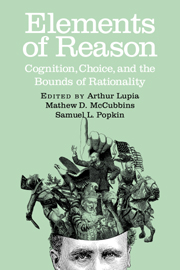Book contents
- Frontmatter
- Contents
- List of Tables and Figures
- Acknowledgments
- List of Contributors
- Beyond Rationality: Reason and the Study of Politics
- PART I EXTERNAL ELEMENTS OF REASON
- PART II INTERNAL ELEMENTS OF REASON
- 8 Reconsidering the Rational Public: Cognition, Heuristics, and Mass Opinion
- 9 Three Steps toward a Theory of Motivated Political Reasoning
- 10 Knowledge, Trust, and International Reasoning
- 11 Coping with Trade-Offs: Psychological Constraints and Political Implications
- 12 Backstage Cognition in Reason and Choice
- 13 Constructing a Theory of Reasoning: Choice, Constraints, and Context
- References
- Author Index
- Subject Index
12 - Backstage Cognition in Reason and Choice
Published online by Cambridge University Press: 05 June 2012
- Frontmatter
- Contents
- List of Tables and Figures
- Acknowledgments
- List of Contributors
- Beyond Rationality: Reason and the Study of Politics
- PART I EXTERNAL ELEMENTS OF REASON
- PART II INTERNAL ELEMENTS OF REASON
- 8 Reconsidering the Rational Public: Cognition, Heuristics, and Mass Opinion
- 9 Three Steps toward a Theory of Motivated Political Reasoning
- 10 Knowledge, Trust, and International Reasoning
- 11 Coping with Trade-Offs: Psychological Constraints and Political Implications
- 12 Backstage Cognition in Reason and Choice
- 13 Constructing a Theory of Reasoning: Choice, Constraints, and Context
- References
- Author Index
- Subject Index
Summary
Understanding how people reason and choose – the mechanisms, the biases, the constraints, the possibilities, the limits – is like understanding how people see. We have complicated and detailed folk theories of vision that are implicitly repeated throughout the culture. These theories seem so commonsensical and inevitably right that they form an unquestioned set of assumptions for most of us. About vision, we expect science to fill in technical details but not to surprise us. Yet cognitive science and neuroscience have shown conclusively that these folk theories of vision are very deeply wrong. For the most part, it is only these researchers who ever have the opportunity to question the folk theories of human vision, and even they must remain vigilant against the folk theories' influence. Someone who follows the folk theories of vision will think that anyone blind has no knowledge of the visual field and that the perceived color of an object is determined by the light it reflects. But these and other commonsensical expectations are demonstrably wrong. Someone who holds the folk theories will give wrong stories about the operations of vision, wrong predictions about what people will see under specified conditions, and wrong explanations of why people see as they do.
Just so, we have complicated and detailed folk theories, implicitly repeated everywhere, of how people reason and choose. They seem so inevitably right as to have come to form an unquestioned set of assumptions. They have had exceptionally strong influence on even the most advanced social scientific analyses. But cognitive science has begun to demonstrate how mistaken these folk theories may be.
- Type
- Chapter
- Information
- Elements of ReasonCognition, Choice, and the Bounds of Rationality, pp. 264 - 286Publisher: Cambridge University PressPrint publication year: 2000
- 5
- Cited by



